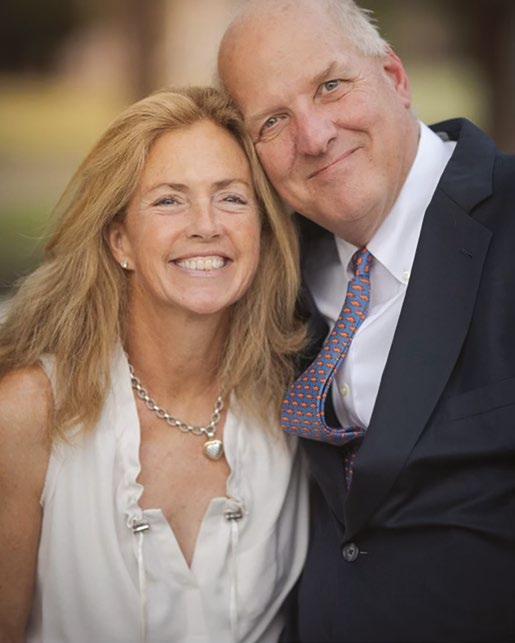
5 minute read
Harold Green '74
From Entrepreneur to Ecopreneur
Even when he is sleeping, Harold Green ’74’s thoughts rarely stop churning. The “serial entrepreneur” keeps a pen and notepad by his bedside because he never knows when the muse might strike.
The same goes for the hours when he is cutting acres on his Monkton, Md., horse farm, steering his 24-foot Batwing tractor at 11 MPH. “I always have a piece of paper with me,” Harold says. “That’s my thinking time, because I’m away from distractions.”
The distractions are plenty for Harold and have been since he graduated from Choate. He describes himself as “not the typical student” because his brain was always thinking beyond the classroom to the next chance to innovate. “School and the traditional educational format didn’t fit my personality and my drive to do things differently,” he explains.
Still, in the spring of his sixth form year, Harold partnered with Richard McDonough, former commissioner of insurance for New Jersey, to write the first no-fault insurance policy, a plan subsequently approved by the N.J. Legislature. Though it was a powerful experience, Harold realized he did not want to do similar work in the future.
While giving both George Washington University and Georgetown a try (he eventually decided higher education was not for him), Harold started
his first business, Chamberlain Contractors, a year removed from Choate. Decades after launching that successful asphalt paving company, Harold was still modernizing his business. In the early 1990s, he established a recycling operation to collect asphalt and concrete rubble, turn them into useful byproducts, and sell them. During that same period, he began testing a process to blend the byproducts with liquid asphalt cement emulsified in water. He further enhanced his process when he bought a KMA cold recycling mixing plant, which introduces processed asphalt, cement, water, and other elements under pressure to make eco-friendly asphalt.
“It’s about a quarter of the cost of conventional hot mix asphalt,” Harold explains, “and the carbon footprint is 90% less.”
After a decade of using recycled materials to differentiate his company, in 2012, Harold created one of the first methodologies to capture, validate, and verify carbon emissions associated with using alternative environmentally friendly construction materials. The process was approved by Verra, a carbon registry that “sets the world’s leading standards for climate action and sustainable development,” and patented by Harold and his latest company, Global Emissionairy (GE). GE incentivizes paving and transportation organizations “with carbon credits to use recycled materials and sustainable installation methods.”
“We capture data from various sources, go through a verification process, and then post, issue, and sell those carbon emissions.” Harold explains. “I’m one of the first companies worldwide to have created this technology.”
If you have driven down I-81 in Virginia near Roanoke, you have been impacted by Harold’s forward-thinking approach. Sections of that road were resurfaced through the pavement recycling process his company perfected. The original I-81 project was estimated to cost more than $50 million and take two years to complete. Instead, through GE’s alternative method, the job took less than two months and cost the Virginia State Department of Transportation $7.5 million, a significant savings for taxpayers. Harold has a new project on tap to help asphalt companies comply with California’s zeroemissions mandate for hot asphalt through carbon credits, and his primary focus has shifted to working with incubators and accelerators to help them capture their own carbon emissions.
The visionary nature of Harold’s career can be traced to his youth in New Jersey. His father was a lawyer by trade but an entrepreneur at heart, who helped bring movies to airlines in the 1960s. The elder Mr. Green died suddenly after Harold’s first year at Choate but had been instrumental in arranging a call between his son and then Headmaster Seymour St. John, notifying Harold of his admission.
“While my father’s death was very unsettling, I already had the skill set I needed to succeed,” Harold says. “I was always told I could do whatever I wanted, as long as I gave it the right amount of energy.”
From as early as age eight, he worked at a local country club, lining tennis courts, mowing fairways, and deveining shrimp in the kitchen. He also traveled the world with his family and had a chance to see how other countries ticked. Even though school was not exactly his thing, Harold says he “refined [his] entrepreneurial talents at Choate.” While he will forever be an entrepreneur, today Harold also dubs himself an “ecopreneur.” He recently sold Chamberlain Contractors and his asphalt, concrete, and recycling plants to focus on the carbon emissions market through GE.
“I’ve been freed up, but I’m a serial entrepreneur, and will always look for the next deal,” he says. “For me, being this way wasn’t any risk. I just knew I could do whatever I set my mind to.”
By Jana Brown
Jana Brown is a New Hamphsire-based writer and editor.




